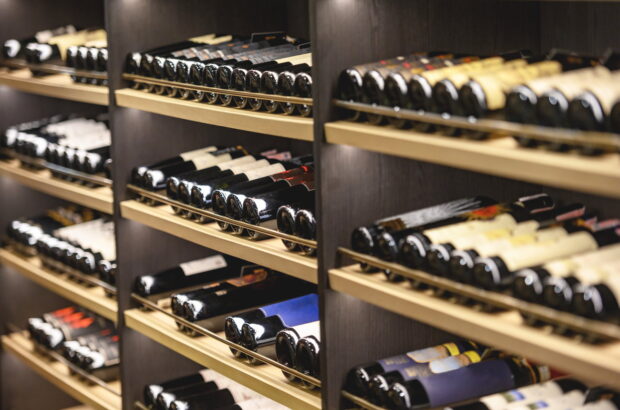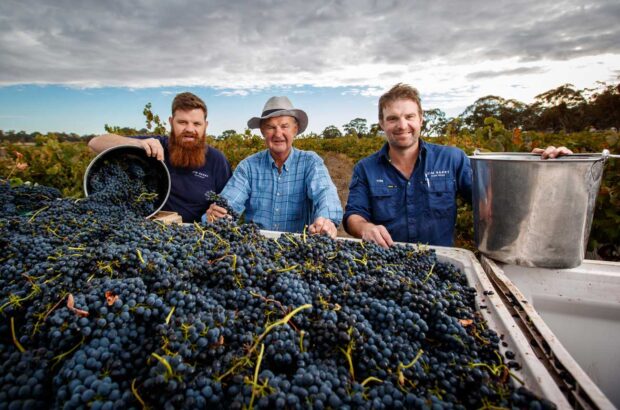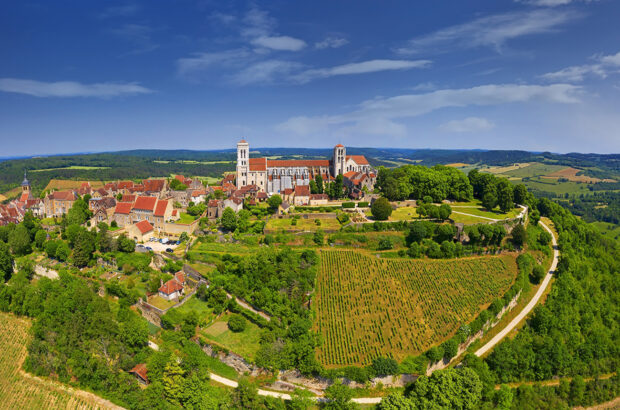Let’s be honest. An interview with Christian Moueix is a rare and remarkable event. As a reserved, self-deprecating man, Moueix neither needs nor likes the potentially inflammable oxygen of publicity. ‘It is not in my nature,’ he says. Yet, here we were in Châteaux Pétrus’ small salle de reception, separated by an immaculately polished table. On it, my tape recorder was running. So why now?
Bordeaux
The simple, one word answer is Bordeaux. ‘For some time, we have been severely criticised, even stigmatised around the world. It is time to respond positively and put the case for Bordeaux,’ says Moueix, cutting quickly to the chase. Above all, he believes that his native region has arrived at a new crossroads following the excellent 2000 vintage and he is determined to ensure it doesn’t take yet another wrong turn. ‘In recent years, we have made some big mistakes,’ he says, ‘the 1997 en primeur price hike being the most obvious of many. On that occasion Bordeaux went out of control.’ ‘The damage was very serious and it will last for a long time. Unless, we act now to put it right.’ As a result, Moueix feels that this latest vintage is a genuine opportunity to restore some much needed confidence in Bordeaux. ‘It’s a good vintage on both banks which means we can sing in unison about quality. So if the owners price it sensibly, then Bordeaux could be back on track. Sadly, we know that this is unlikely to happen. But there is still time between now and March. It’s not too late,’ he adds, almost imploringly.
Château accommodation in Bordeaux
Of course, Moueix understands the dynamics all too well. ‘Most producers judge the quality of their wine in relation to the price of their neighbour’s. So our pricing policy is almost entirely fuelled and driven by jealousy. Far too few look at the big picture. Almost everyone seems blinkered and short-sighted – it’s our tragic and potentially fatal flaw,’ he comments.
It is a measure of the seriousness of the situation that Moueix is taking such an unprecedented lead at this critical time. ‘The stakes are very high and we need to preserve what is best about Bordeaux. I don’t like this role, but if my generation doesn’t speak out now, we risk losing our reputation as the world’s great classic wine.’
Yet despite being such a reluctant apologist and spokesperson, few people are so well equipped or qualified to argue Bordeaux’s corner as Christian Moueix. ‘His dedication, integrity and honesty are unquestioned,’ says Paul Pontallier at Château Margaux. Hugh Johnson concurs: ‘Christian is rightly regarded as one of the wine world’s most respected, cultured and cerebral figures.’
More on Moueix
Tall, fit and a young-looking 54, Moueix is president-directeur general of Ets J-P Moueix, the Libourne-based firm which was so brilliantly built up by his entrepreneurial father in the 1950s and 1960s. Christian joined the company in 1970 and now rules this formidable Right Bank kingdom which includes such stellar properties as Pétrus (which he manages on behalf of his family), Trotanoy and La Fleur Pétrus as well as Magdelaine in Saint-Emilion. In total, the family concern owns and manages 16 Right Bank châteaux as well as a sizeable négociant business. Comparisons with his legendary, 87-year old father, Jean-Pierre, are inevitable. Christian describes him as ‘hugely talented and utterly charming with a unique sense of quality. In his heyday, he had a rare gift for discovering potential in art and wine’. In turn, Moueix junior has inherited his father’s love of art and wine, and is a keen collector of modern paintings and sculpture. Yet, he also says: ‘It is clear to me that I have not inherited his natural talent to the same extent. This is not a question of modesty because the gap is too large. The only way I can make it up is by working very hard – full-time, few holidays and 5am starts. ‘But please don’t misunderstand me. I enjoy my life and work enormously.’ Others would argue that Christian is being far too self-effacing. Hugh Johnson, who knows both men well suggests that, Christian’s ‘mild and charming exterior conceals a steely core. He is very much his own man’.
There are some obvious differences between the two generations. Christian is more of a humanist, intellectual and philosopher. He is also a man of the soil, preferring the role of farmer to that of businessman. Even in their management styles, Christian is more inclusive where his father was autocratic. Certainly, one of his great passions is viticulture – an area in which he is recognised as both an expert and innovator. In 1973, Moueix was the first to conceive and carry out the then revolutionary and controversial practice of green harvesting in order to increase concentration and alcohol. At first, he kept it secret, hiding the grapes and dumping them in the river at night. But, eventually, he was found out and a storm of controversy broke around him. ‘Everyone was furious, especially my father. Even the priest at Saint-Emilion chastised me in church.’
In spite of the brick-bats Moueix persevered, comparing the results until it became clear he was right all along. Now, of course, everyone does it. Meanwhile, to keep ahead of the game, Moueix has refined the practice further and currently carries out three different green harvests rather than one. Inevitably, this means additional time in the vineyard – this year, 20,000 extra man hours across all Moueix châteaux.
But Christian is convinced of the benefits in the finished product. ‘Great wine is made in the vineyard and always has been. It’s a dangerous mistake to think that technology can compensate for what is missing in the first place.’ Moreover, Moueix is nothing short of fanatical in his quest to make truly great wine. ‘I am a perfectionist to the point of mania,’ he admits. It’s a view supported by Adam Brett-Smith of Corney & Barrow, Pétrus’ UK agents, who recounts some of Moueix’s more notable ‘helicopter’ incidents. ‘The first was in 1987 when he tried to dry off the vines – a brilliant exercise in lateral thinking,’ says Brett-Smith.
‘But the second took place in the frost-hit vintage of 1991. On that occasion, Christian flew the helicopter at very low level in order to fan back the heat from the burning braziers. The trouble was that he was doing this at 3am, in pitch black conditions. It was foolhardy to say the least.’
Unfortunately, this potentially dangerous stunt didn’t work and Christian couldn’t save his crop from the cold. But that wasn’t the end of the story. Rather than selling a sub-standard vintage of Pétrus, Moueix took the brave and costly step of offering no grand vin that year. Such bold flourishes have now gone into vinous folklore. Moreover, they have undoubtedly helped to build the quality and reputation of Château Pétrus, the Merlot-rich jewel in Moueix’s crown. Ably assisted by his oenologue of 36 years, Jean-Claude Berrouet, Pétrus continues to produce classic vintages of awesome quality. Moueix rates his very best as 1982, 1989 and 1998. ‘With the latter, we were lucky. We picked just before the rain,’ he says. ‘As for 2000, it’s looking very good. Not as great as 1998, but certainly a vin de garde.’
The secret of success?
So what is the secret of its success? ‘There is no secret,’ replies Moueix. ‘Except in the soil, which is geologically unique – a button-hole of clay, shot through with iron. It is such great terroir that it would be criminal if we didn’t make great wine.’ And yet Moueix and Berrouet have been accused of just such criminal negligence. Most notably by Robert Parker who, in the past, has criticised the wines not only of Pétrus but also Trotanoy and La Fleur Pétrus for failing to live up to past glories. Moueix doesn’t hesitate to acknowledge this. ‘You’re right. Bob Parker is occasionally critical and I have paid attention to his comments when they were deserved. There was a slight weakness in the mid-1980s which he noticed and we corrected.’
Without doubt they have an interesting relationship based on mutual respect. ‘I admire and like Bob Parker and have done for many years. Yet I consider myself lucky enough to be independent in that I can afford to produce a wine that he may not like,’ Moueix says. ‘Of course, I don’t do this deliberately and I hope he appreciates the distinction. But I will never change my winemaking philosophy of producing classic, harmonious and natural wines to please him or anyone else. Our wines are meant to be enjoyed and drunk – not tasted and spat in comparative tastings.’ This brings us neatly onto the topic of the new ‘cult’ wines, which Pétrus so often finds itself compared to. ‘I think cult wines have positive and negative sides,’ says Moueix. ‘They are stylistically dangerous because people are picking at super-ripe levels. In so doing they risk losing the essential quality of subtlety and complexity of classic Bordeaux. Nevertheless, the best wines challenge us all to do better. ‘In that respect, Le Pin has probably been the most beneficial thing to have happened to Pétrus in the last 20 years. So there is no real jealousy on my part. We have a very good rapport and they have done a great job. There’s no doubt that in the 1980s, when Le Pin was a rising star, some vintages were better than Pétrus. But I hope that the 1990s and in the future, Pétrus will prove to be the better wine.’
Dominus
However, Bordeaux’s Right Bank is not Christian Moueix’s only fiefdom. In addition, he also owns Dominus, a prestigious estate in the Napa Valley producing a richly elegant Cabernet-based wine. Moueix fell in love with California when he was a graduate student at UC Davis in the late 1960s. ‘I also fell in love with the great Napa wines of the 1940s and 1950s made by Inglenook and BV.’ A decade later, he asked Bob Mondavi to help him find a vineyard to try and recreate these great old classics. The search ended in 1981 at the Napanook vineyard, part of the old Inglenook Estate. Its first vintages were 1983 and 1984. ‘Neither was perfect,’ says Moueix. ‘But we had no winery, no experience of Cabernet and not much knowledge of the vineyard. But because of Pétrus, people expected us to make great wine from the word go. It wasn’t possible.’
The early wines were heavily criticised, partly because they were so different from the Napa norm. ‘In those days, the emphasis was on technological wines, ‘sculpted’ in the winery, whereas Dominus was always a natural wine whose quality came from the vineyard.’ Typically, Moueix continued to plot his own course, resolutely refusing to adjust or acidify his wine. Now, of course, it’s a different story. California has followed the lead of Moueix and people like Paul Draper in the move to more natural, terroir-based wines. As for Dominus, the wines have continued to get better and better, really hitting their stride in the 1990s. To cap it all, he now has an award-winning winery which can only increase quality yet further. ‘I could not be happier. Dominus is like a mistress that doesn’t cause you any trouble,’ says a smiling Moueix.
Back home in Bordeaux, though, things are not so tranquil. The big question remains whether Christian can use his power, charm and influence to help steer Bordeaux out of trouble. It’s a mighty tough challenge and the clock is ticking. Only time will tell whether he can pull it off.












